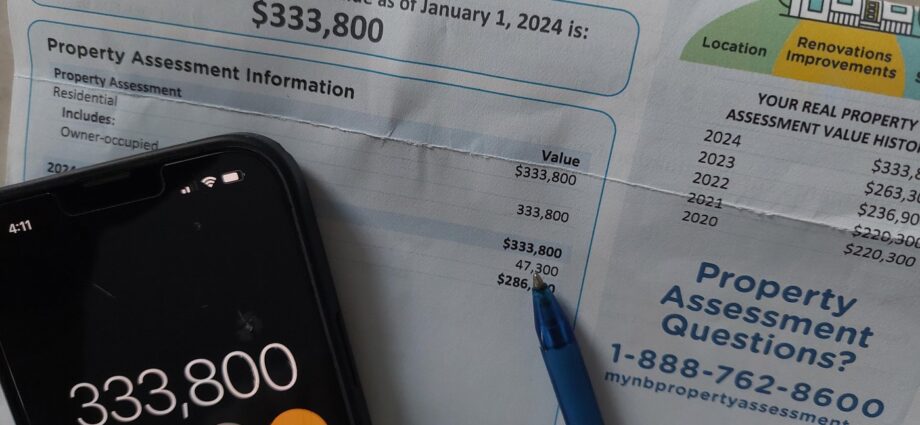
By John Chilibeck, Local Journalism Initiative Reporter, The Daily Gleaner
January 22, 2024
Tax rates filed by New Brunswick’s eight cities show many homeowners are going to be financially whacked by rising assessments.
In the face of steeply rising property assessments, Brunswick News asked the provincial government this week for the local tax rates filed by all of New Brunswick’s 89 local government entities.
Clarissa Andersen, a spokesperson with the Department of Environment and Local Government, said it was unable to do so because “the 2024 tax rate table is not yet compiled,” despite tax bills due in less than two months.
Brunswick News instead decided to compile the statistics from the province’s eight cities, where a sizable portion of the population lives.
The figures show that four of the eight cities left their rates in most populated areas the same for 2024, and the other four made such small cuts to their rates, many people who live or run businesses there won’t be able to stave off big tax increases.
Mayor blames province
Adam Lordon, the president of the Cities of New Brunswick Association, said he’s heard the chatter online and in the media of people frustrated with rising taxes.
But he argued the cities had little room to manoeuvre when setting their rates.
“The backbone of our revenues come from property taxes, and we rely on it to cover the costs of services and infrastructure provided to our citizens,” said Lordon, who’s also the mayor of Miramichi and soon-to-be-chair of the urban municipal caucus within the Union of the Municipalities of New Brunswick, once the cities association formally merges with it next month.
“We continue to call for a modern fiscal framework for municipalities and the completion of provincial fiscal reforms that the province started.”
Earlier this week, the provincial government released property assessments that are supposed to reflect what’s happening in the real estate market.
With housing prices shooting up, so have assessments. Nine out of every 10 property owners across the province are facing increases, and four out of every 10 will see assessment hikes of more than 10 per cent.
This is significant when tax bills are mailed out March 1. Property taxes are calculated by multiplying the assessed value of a home or business by a local municipal tax rate.
Small rate cuts, big tax hikes
Saint John’s municipal council cut its rate the steepest, by four cents, from $1.62 to $1.58 per $100 of assessed property. But that’s only a cut of 2.5 per cent.
A huge proportion of Saint John homeowners and businesses face assessment increases of 10 per cent, possibly more, if they do not qualify for the province’s special spike protection mechanism. And even that mechanism only staves off the property tax increase above 10 per cent temporarily. In future years, the assessed worth in 2024 will eventually be fully taxed.
Put another way, if a household in Saint John has received notice that their assessment just went up 10 per cent, once the tax rate is applied, they will see their property taxes jump by about 7.5 per cent.
In the major city centres, Dieppe also cut its rate (by three cents, from $1.46 to $1.43, a total of 2.1 per cent), as did Moncton (by two cents, from $1.44 to $1.42, a drop of 1.5 per cent), and Fredericton (by one cent from close to $1.34 to $1.33, relief of 0.7 per cent).
None of these rate cuts will shield a large proportion of homeowners and businesses from higher taxes during a time of rising costs. People are paying dearly for groceries, housing, transportation and other necessities since the pandemic. Inflation in New Brunswick was over seven per cent in 2022 – the highest in the country – and over four per cent in 2023.
And the situation in Miramichi, Bathurst, Campbellton and Edmundston is potentially worse, as none of these cities changed their principal tax rates.
In other words, there’s no offset for rising assessments in those communities to provide any kind of tax relief.
Minister blames municipalities
Mary Wilson, the Progressive Conservative minister responsible for Service New Brunswick and assessments, told Brunswick News earlier this week it was entirely within the power of local governments to lower their rates to ensure homeowners and businesses don’t pay higher taxes.
Lordon said that was only telling half the story.
“Ultimately this comes down to cities being inadequately funded by the province,” he said. “We are also facing the inflationary environment for everything we try to do, whether that be for maintaining roads, the cost of wages and salaries and almost every contract we tender.”
The mayor said since being on Miramichi council in 2016, he’d never seen so many contract bids coming in over the city engineer’s estimate.
And he took issue with the provincial government downloading responsibilities and not contributing what he described as a fair share to big community projects.
As an example, he cited the homelessness situation plaguing New Brunswick cities, with municipal leaders springing to action, even though social welfare programs are traditionally the responsibility of the provincial government.
He also criticized the Tory government for not contributing its one-third share for community projects such as the multiplex centre that Miramichi wants to build.
The province has agreed to kick in $12 million to the project, while Ottawa has pledged to fund up to $18 million. When originally announced five years ago, it was estimated to cost $60 million, a figure that’s risen to $80 million.
One-third of the price tag would be closer to $27 million.
“That’s how much it’s risen in the five years we were waiting for a response from the province for funding,” the mayor said. “And the province certainly doesn’t contribute to every infrastructure project. But to facilitate growth, we need more water and sewer pipes, and we’re not receiving any funding for that either.”
Subscribe to our newsletter.


